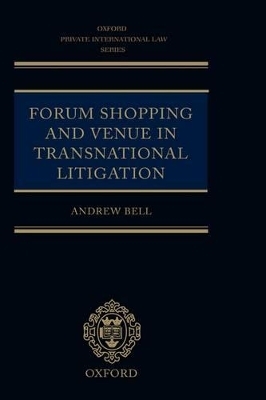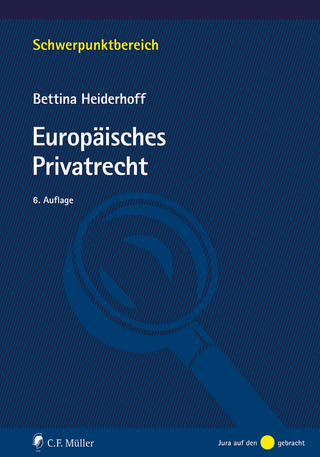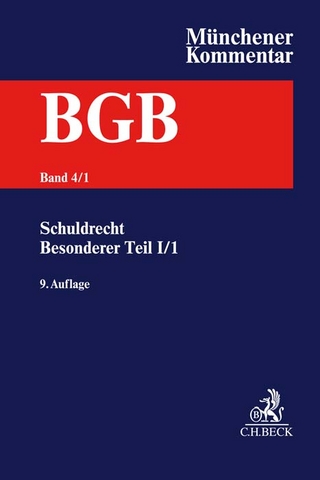
Forum Shopping and Venue in Transnational Litigation
Seiten
2003
Oxford University Press (Verlag)
978-0-19-924818-6 (ISBN)
Oxford University Press (Verlag)
978-0-19-924818-6 (ISBN)
This book provides an in-depth study of the conditions for, motivations behind and techniques of forum shopping as well as possible defences against it. It will be of interest to practitioners, judges and academics throughout the common law world, the European Union and the United States.
The rules by which a venue is selected and settled upon for the resolution of any given transnational dispute have fostered a complex, fascinating and burgeoning body of law of great commercial significance. As courts and legislatures seek to fashion sophisticated yet practical jurisdictional responses to this issue, practitioners strive to maximize their clients' prospects of success by securing their own preferred venue. For so long as different forums yield the prospect of different outcomes in the resolution of any given dispute, litigation about where to litigate is inevitable.
Forum shopping is the province of plaintiffs and defendants alike. This book examines the fascinating competition to win the battle for venue in transnational litigation.
It first identifies and analyses the pre-conditions and incentives for forum shopping. These serve to explain not only the frequent intensity of interlocutory litigation relating to questions of venue but also the reason why much transnational litigation settles once the issue of venue is resolved, in turn underlining the practical significance of the subject. The guiding principle of the 'natural forum' - the common law's conceptual response to disputed questions of venue - is subjected to detailed analysis and compared with the more orderly response of jurisdiction-regulating conventions, most successfully effected in EU Regulation 44/2001 and its progenitor, the Brussels Convention. Then the various techniques of what can be called 'reverse forum shopping' including the evolving law relating to anti-suit injunctions and its interplay with the concept of international judicial comity are considered in detail. Finally, the book examines the role of, and the law relating to, jurisdiction and arbitration agreements in transnational litigation, including the manifold techniques by which parties seek to (and frequently do) extricate themselves from these forum-selection arrangements.
The rules by which a venue is selected and settled upon for the resolution of any given transnational dispute have fostered a complex, fascinating and burgeoning body of law of great commercial significance. As courts and legislatures seek to fashion sophisticated yet practical jurisdictional responses to this issue, practitioners strive to maximize their clients' prospects of success by securing their own preferred venue. For so long as different forums yield the prospect of different outcomes in the resolution of any given dispute, litigation about where to litigate is inevitable.
Forum shopping is the province of plaintiffs and defendants alike. This book examines the fascinating competition to win the battle for venue in transnational litigation.
It first identifies and analyses the pre-conditions and incentives for forum shopping. These serve to explain not only the frequent intensity of interlocutory litigation relating to questions of venue but also the reason why much transnational litigation settles once the issue of venue is resolved, in turn underlining the practical significance of the subject. The guiding principle of the 'natural forum' - the common law's conceptual response to disputed questions of venue - is subjected to detailed analysis and compared with the more orderly response of jurisdiction-regulating conventions, most successfully effected in EU Regulation 44/2001 and its progenitor, the Brussels Convention. Then the various techniques of what can be called 'reverse forum shopping' including the evolving law relating to anti-suit injunctions and its interplay with the concept of international judicial comity are considered in detail. Finally, the book examines the role of, and the law relating to, jurisdiction and arbitration agreements in transnational litigation, including the manifold techniques by which parties seek to (and frequently do) extricate themselves from these forum-selection arrangements.
Andrew Bell is a barrister practising at the New South Wales bar in Australia and sometime Vinerian Scholar at the University of Oxford.
FOREWORD BY SIR ANTHONY MASON
| Erscheint lt. Verlag | 6.2.2003 |
|---|---|
| Reihe/Serie | Oxford Private International Law Series |
| Verlagsort | Oxford |
| Sprache | englisch |
| Maße | 164 x 241 mm |
| Gewicht | 697 g |
| Themenwelt | Recht / Steuern ► Allgemeines / Lexika |
| Recht / Steuern ► EU / Internationales Recht | |
| Recht / Steuern ► Privatrecht / Bürgerliches Recht ► Internationales Privatrecht | |
| Recht / Steuern ► Privatrecht / Bürgerliches Recht ► Zivilverfahrensrecht | |
| Sozialwissenschaften ► Politik / Verwaltung ► Europäische / Internationale Politik | |
| ISBN-10 | 0-19-924818-4 / 0199248184 |
| ISBN-13 | 978-0-19-924818-6 / 9780199248186 |
| Zustand | Neuware |
| Haben Sie eine Frage zum Produkt? |
Mehr entdecken
aus dem Bereich
aus dem Bereich
1. Halbband: §§ 433-480, CISG
Buch | Hardcover (2024)
C.H.Beck (Verlag)
119,00 €


